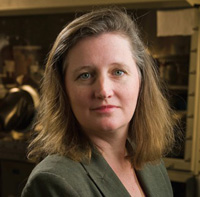Alberta Innovates Energy and Environment Solutions Lecture title: Wavelength-selective photovoltaics for power generating greenhouses
Dr. Sue Carter
Professor of Physics
University of California - Santa Cruz, USA
3:30pm - November 21, 2013
(ETLC) 1-001
Host: Dr. Zhenghe Xu
Abstract:
While photovoltaic (PV) technologies are being developed that have the potential for meeting the cost target of $0.50/W per module, the cost of installation combined with the competition over land resources could curtail the wide scale deployment needed to generate the Terrawatts per year required to meet the world's electricity demands. To be cost effective, such large scale power generation will almost certainly require PV solar farms to be installed in agricultural and desert areas, thereby competing with food production, crops for biofuels, or the biodiversity of desert ecosystems. This requirement has put the photovoltaic community at odds with both the environmental and agricultural groups they would hope to support through the reduction of greenhouse gas emissions and has resulted in several lawsuits filed by environmental groups to stop solar farm installations.
In this talk, I will discuss a possible solution to this challenge through the use of wavelength-selective solar collectors that enable the wide scale deployment of low cost translucent photovoltaic cell technology on land used for food or biofuel production. Costs are reduced through simultaneous use of land for both food and power production, by replacing the PV cells by inexpensive long-lived luminescent materials as the solar absorber, and by integrating the panels directly into existing greenhouse or cold frames. I will discuss our results on power generation and crop yields for trials done at commercial greenhouse growers in California and the upcoming trials planned with greenhouse growers in Alberta, Canada.
Biography:
 Sue Carter obtained her bachelors degree in chemistry, physics and mathematics from Kalamazoo College and her PhD in Physical Chemistry from the University of Chicago. She worked at Bell Laboratories in Murray Hill and IBM Almaden Research Center before becoming a faculty member at the University of California, Santa Cruz (UCSC) in 1995. As a professor of Physics at UCSC, Carter has worked on correlated electron systems, flat panel display technologies, biosensors and organic and nanoparticle electronics. For the last 15 years, she has also worked in developing new photovoltaic technologies, comprised of organic, CdTe, CZTS, and quantum dot materials as well as wavelength-selective photovoltaics. She was also the Chief Technical Advisor fro Add-vision from 2000 to 2005 and founder and scientific advisor of Solexant, a nanoparticle PV start-up from 2007 to 2011.
Sue Carter obtained her bachelors degree in chemistry, physics and mathematics from Kalamazoo College and her PhD in Physical Chemistry from the University of Chicago. She worked at Bell Laboratories in Murray Hill and IBM Almaden Research Center before becoming a faculty member at the University of California, Santa Cruz (UCSC) in 1995. As a professor of Physics at UCSC, Carter has worked on correlated electron systems, flat panel display technologies, biosensors and organic and nanoparticle electronics. For the last 15 years, she has also worked in developing new photovoltaic technologies, comprised of organic, CdTe, CZTS, and quantum dot materials as well as wavelength-selective photovoltaics. She was also the Chief Technical Advisor fro Add-vision from 2000 to 2005 and founder and scientific advisor of Solexant, a nanoparticle PV start-up from 2007 to 2011.
In 2012, she cofounded Soliculture to commercialize wavelength-selective photovoltaics for power-generating greenhouse and crop cover technology and she also founded the IRIS Science Academy to accelerate K-12 science education, inquiry, and research. Carter has served on the board of the UC Energy Institute and California Solar Collaborative, as an editor for the MRS Bulletin and the AIP Journal of Renewable and Sustainable Energy, and is currently serving as Chair-elect for the American Physical Society Group on Energy Research and Applications (GERA).